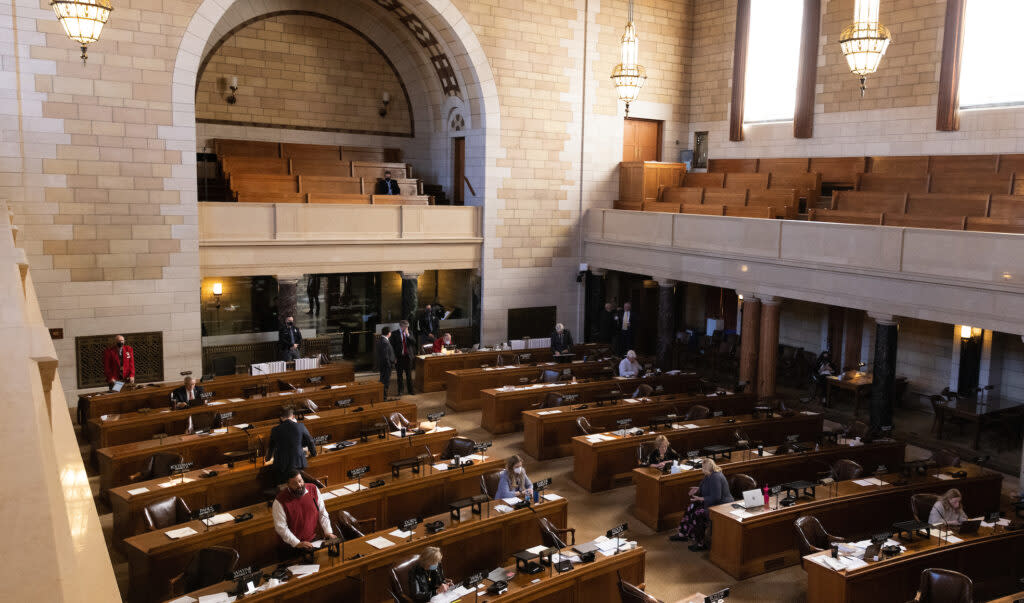Nebraska lawmakers unanimously pass privacy law

- Oops!Something went wrong.Please try again later.
State senators debate on the floor of the Nebraska Legislature at the Nebraska State Capitol Building. (Rebecca S. Gratz for Nebraska Examinerz)
In 2021, the U.S. Supreme Court ruled that Americans have a right to privacy when supporting nonprofit causes. This year, Nebraska lawmakers unanimously passed legislation to implement that ruling and guard against privacy violations by state agencies.
The Personal Privacy Protection Act, included in Legislative Bill 43, prohibits state officials from going beyond existing law to demand or expose Nebraskans’ personal information and donation records to nonprofits. The law ensures that citizens can safely and privately give to the causes they care about without fear of their data being leaked or abused by government agencies.
The rise of doxing and an increasingly heated political environment have raised awareness of the need to enhance privacy protections in current law. Nonprofits depend on the ability to protect their members when speaking out about contested issues in government and society. Every American should be free to join and support groups that advocate for their beliefs without harassment or retaliation.
State Sens. Rita Sanders, a Republican, and Danielle Conrad, a Democrat, cosponsored LB 43. The bipartisan legislation passed unanimously, without a single vote against the bill at any stage of the legislative process. On March 27, Gov. Jim Pillen signed the bill into law.
“I see it as really the right to associate with your fellow citizens, with your neighbors in support of causes that you believe in and free from government interference,” said Conrad at a hearing on the initial version of the bill.
“I may support organizations that Senator Conrad doesn’t and the same may be true the other way around,” said Sanders. “But we both believe in protecting everyone’s right and freedom of speech, specifically by supporting nonprofit organizations privately and without harassment. This is something we can all agree on.”
The law was also supported by a variety of nonprofit groups, some of whom disagree passionately on most policy issues. Among the supporters were the American Civil Liberties Union of Nebraska, Alliance Defending Freedom, Americans for Prosperity, Nebraska Cattlemen, Nebraska Family Alliance, People United for Privacy, Platte Institute, and the University of Nebraska System. Several groups testified in support of the bill as a vital protection for the First Amendment right to collective expression and the related right to associational privacy.
The Supreme Court’s concern for donor privacy is longstanding. In the 2021 case,
Americans for Prosperity Foundation (AFPF) v. Bonta, California’s attorney general demanded that all registered nonprofits in the state submit their confidential donor list to state officials. In striking down the demand, the Supreme Court pointed to a litany of previous cases defending the right to privacy in association.
In the 1950s, Alabama state officials sought to force the NAACP to disclose its membership list. The state’s demand
was a straightforward and brazen attempt to smother the burgeoning Civil Rights Movement in Alabama. Fortunately, the court struck down the state’s demand unanimously and ruled that Americans have a constitutional right to join and support nonprofits without being monitored by state officials.
NAACP v. Alabama was followed by several other cases further establishing the right to privacy in association. Yet, despite these rulings and
AFPF v. Bonta, some state officials and activists continue to seek ways to compel nonprofits with missions they oppose to expose their supporters’ names and home addresses. The goal is always the same: to name-and-shame donors, intimidate and harass them into silence, and ultimately, shut down groups they disagree with.
Nebraskans now have an additional layer of privacy to protect them from those harms. They are not alone. Eighteen other states have adopted similar laws in recent years in response to the court’s 2021 decision and growing concerns about personal privacy and political violence.
The bipartisan privacy movement in Nebraska and elsewhere is a hopeful sign for our country. The Cornhusker State now becomes a landmark in that movement through the unanimous passage of LB 43.
The post Nebraska lawmakers unanimously pass privacy law appeared first on Nebraska Examiner.

